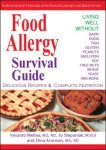Lactose-Intolerance vs Dairy Allergy:
How to Tell the Difference, What to Do
by www.SixWise.com
As many as 50 million Americans suffer from a dairy intolerance while up to 3 percent of infants worldwide have an allergy to milk or other dairy products. Contrary to popular belief, these two conditions are vastly different, and require unique methods of treatment and care.
|

If you can tolerate small amounts of milk, you're likely dealing with lactose intolerance, not a dairy allergy.
|
What is Lactose Intolerance?
This condition (sometimes also called lactase deficiency) is an inability to fully digest lactose, or milk sugar, in dairy products. It's caused by a deficiency in lactase, an enzyme produced by your small intestine that breaks down lactose.
While lactose intolerance is not exactly dangerous, it does cause painful and inconvenient symptoms anywhere from 30 minutes to two hours after eating a food that contains lactose. These symptoms include:
-
Diarrhea
-
Nausea
-
Abdominal cramps
-
Bloating
-
Gas
While some people are born being lactose intolerant, it's rare. More often the condition occurs as you age, when your body naturally decreases lactase production. Lactose intolerance can also occur along with other intestinal illnesses, such as celiac disease or Crohn's disease.
|
Got Food Allergies? Get The Food Allergy Survival Guide Book!
 For a complete guide on how to eat if you have food allergies and intolerances, check out the highly recommended Food Allergy Survival Guide Book. In it you'll learn: For a complete guide on how to eat if you have food allergies and intolerances, check out the highly recommended Food Allergy Survival Guide Book. In it you'll learn:
-
How to avoid the foods and ingredients that trigger reactions
-
How to substitute healthful ingredients for those that trigger allergic responses
-
How to meet recommended nutrient intakes while avoiding trigger foods such as dairy products, eggs, gluten-containing grains such as wheat, or other food culprits
-
How to determine which food(s) may be triggers for your symptoms ... and much more!
Find out More About The Food Allergy Survival Guide Book Now!
|
If you love dairy but are lactose intolerant, there's good news: it doesn't mean you can't ever eat dairy. Consuming dairy products in small amounts and with other foods usually helps to bypass symptoms. Also, certain dairy foods, such as hard cheeses, have small amounts of lactose and can be enjoyed by most people. Cultured milk products like yogurt and kefir are also a good choice because they contain good bacteria that help break down the lactose for you.
Other options for people with lactose intolerance include taking probiotics -- good bacteria that may help your body digest lactose -- and using lactase enzyme tablets just before a meal or snack.
What is a Dairy Allergy?
An allergy to dairy, and milk in particular, is one of the most common food allergies in children. Though it was previously believed that most infants outgrow milk allergies by the age of 3, a recent study found that only 19 percent of the over 800 children in the study outgrew their allergy to milk by the age of 4.
Unlike lactose intolerance, a milk allergy is caused by an immune system malfunction in which your immune system mistakenly recognizes milk proteins as being dangerous, and then produces a response against them.
Both casein and whey, two proteins in milk, can cause an allergic response, and you can be allergic to one or both (most often it's both). The symptoms that may occur immediately after consuming milk include wheezing, vomiting and hives. After some time has passed, you may also experience:
|

Allergic to milk? Watch out for these hidden sources of dairy ingredients on food labels:
- curds
- whey
- ghee
- casein
- caseinates (in the form of: calcium, potassium, sodium, magnesium, and ammonium)
- rennet casein
- lactose
- lactulose
- hydrolysates
- lactalbumin
- lactoglobulin
|
The only way to prevent the symptoms of a milk allergy is to avoid all milk and milk proteins. Since milk is such a common ingredient, this can be a daunting task, so we highly recommend consulting the Food Allergy Survival Guide if you have a milk allergy.
The Food Allergy Survival Guide is a great resource book with a full spectrum of information regarding food allergy and health issues, delicious recipes and a guide to complete nutrition, no matter what your needs. One of the best surprises of this book is the complete cookbook with every recipe completely free of ALL major allergens!
While anyone can develop a milk allergy, children with other allergies, atopic dermatitis and a family history of allergies are more at risk. If you are a parent or a parent-to-be, studies show that breastfeeding may reduce your baby's chance of developing a milk allergy, and some doctors even recommend eliminating cow's milk from your diet while nursing.
If you're an adult with a milk allergy (or any food allergy) here are some tips to help:
-
Strictly avoid the food you are allergic to, including any related products.
-
Diligently read food labels (hidden ingredients can be anywhere, but the Food and Drug Administration requires that at least the top eight allergens must be clearly stated on food labels).
-
Let the server in a restaurant know you absolutely cannot have certain ingredients.
-
For those with severe food allergies, always carry a self-injectable epinephrine (often called an Epipen) in case of emergency.
Recommended Reading
Food Allergies Last Longer Than They Used To: Food Allergy Facts You Need to Know
Soy Milk, Rice Milk or Almond Milk: Which is the Best Alternative Milk for You?
Sources
MayoClinic.com Milk Allergy
MayoClinic.com Lactose Intolerance
Whole Foods Market